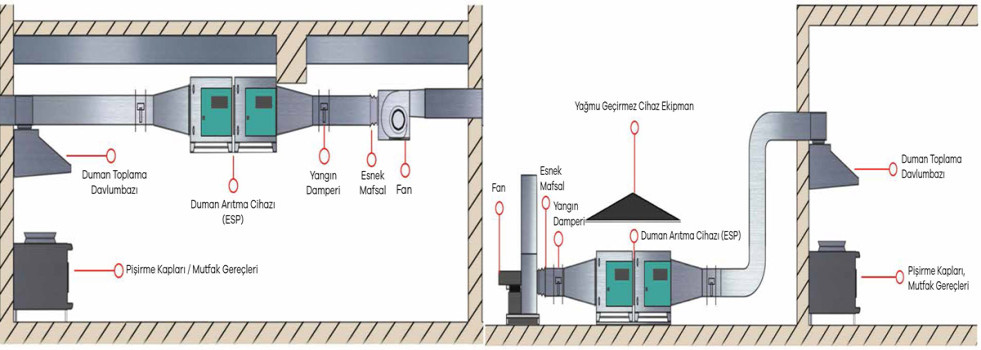
Filter Selection in Odor Filtration Units
Today, air quality in commercial and industrial settings is critically important for health, productivity, and environmental sustainability. Odor, especially in enclosed spaces, can be disturbing for workers and may lead to long-term health problems in some cases. Therefore, odor filtration units play a significant role in HVAC systems. Odor filtration not only eliminates unpleasant smells but also contributes significantly to improving indoor air quality.
Odors are typically caused by the dissolution of organic compounds in the air. Odors emanating from food production facilities, restaurants, wastewater treatment plants, or industrial production areas can be major sources of discomfort. Furthermore, unpleasant odors can negatively impact customer satisfaction in commercial facilities. HVAC systems serve as an essential mechanism to prevent the spread of these odors to both indoor and outdoor spaces.
To ensure effective odor filtration, it is essential to select the right filters. Filters remove bad odors from the air by adsorbing them or separating their chemical components. Filters used in HVAC systems not only eliminate undesirable smells but also enhance the quality of indoor and outdoor air. They create a healthier environment for employees and improve the energy efficiency of the facility.
Types of Filters Used for Odor Filtration
There are various types of filters available for odor filtration in HVAC systems. Each filter type is designed to target specific pollutants and aims to improve air quality. The commonly used filter types for odor removal in HVAC systems include the following:
1. Activated Carbon Filters
Activated carbon is the most widely used filtration material for odor removal. Thanks to its microscopic pores, activated carbon filters adsorb unpleasant odors, gases, and organic compounds, thereby purifying the air. The high surface area of carbon allows it to absorb a large number of chemical compounds. These filters are particularly effective at removing organic and chemical odors.
Applications:
-
Industrial areas and kitchen ventilation systems
-
Odors from waste management facilities and sewage systems
-
Food processing and production areas
Advantages:
-
Effectively removes various unpleasant odors
-
Adsorbs odor molecules, preventing them from lingering in the air
-
Environmentally friendly by reducing the release of chemical substances
2. Ozone (O₃) Filters
Ozone, due to its strong oxidizing properties, effectively eliminates odors, microorganisms, and some harmful compounds in the air. Ozone filters are especially used in environments where organic compounds are present. Ozone oxidizes odors in the air and converts them into harmless compounds, thereby purifying the air. However, the safe use of ozone is crucial, as high levels of ozone can be harmful to human health.
Applications:
-
Food production and processing facilities
-
Wastewater treatment plants
-
Industrial facilities with serious indoor odor problems
Advantages:
-
A very strong oxidizer and disinfectant
-
Eliminates bacteria, viruses, and harmful microorganisms
-
Oxidizes odor molecules and renders them harmless
3. HEPA Filters (High Efficiency Particulate Air Filters)
HEPA filters are particularly effective at capturing fine dust and particles but have limited effectiveness in odor removal. However, some advanced HEPA filters can adsorb certain odors or volatile organic compounds (VOCs). HEPA filters are more effective when combined with activated carbon.
Applications:
-
Clean rooms and sensitive production facilities
-
Areas requiring control of microbiological environments
Advantages:
-
Captures even very small particles with high efficiency
-
Helps purify air of pollutants as well as chemical odors
-
Can be combined with other filters for odor removal
4. Electrostatic Filters
Electrostatic filters capture dust and particles in the air using electrostatic forces. These filters are effective in trapping fine dust, smoke, and similar pollutants, although they are limited in directly removing organic and chemical odors. However, when used in conjunction with activated carbon or ozone, electrostatic filters can increase overall efficiency.
Applications:
-
Dust and particle filtration in industrial facilities
-
Smoke and grease filtration in cooking areas
-
Office and commercial spaces where air quality needs improvement
Advantages:
-
Effectively removes fine dust, particles, grease, and smoke
-
Environmentally friendly and requires low maintenance
Factors to Consider When Choosing Filters for Odor Filtration Units
Filter selection is a critical step in ensuring the efficient operation of odor filtration units. The following are key factors to consider when selecting the most suitable filter for odor removal:
1. Odor Source and Type
For effective odor filtration, the source and type of odor must be identified. For instance, odors from food production facilities originate from organic compounds, while chemical compounds may also be present in industrial facilities. Depending on the source and intensity of the odor, the use of activated carbon, ozone, electrostatic, or HEPA filters may vary.
2. Filter Efficiency
The effectiveness of a filter is measured by how much odor and pollutant molecules it can remove from the air. Filter efficiency is especially important for odor removal. Activated carbon filters may be more effective in removing strong odors, while ozone filters can be effective for other specific odor types.
3. System Design and Application Area
The design of the HVAC system affects the effectiveness of the filtration system used. Filtration units should be designed to regulate airflow appropriately. Additionally, the area where odor removal is to be applied must have a sufficient air exchange rate and proper airflow direction.
4. Energy Efficiency
The energy efficiency of filters is also a significant factor. Features such as cleanability and long service life help save energy and reduce costs in the long term. Some filters, like activated carbon filters, can become saturated over time. Therefore, maintenance and replacement processes should be carefully planned.
Odor filtration is an important application in HVAC systems that improves air quality, enhances workplace productivity, and protects employee health. Selecting the right filters for HVAC systems not only ensures odor removal but also guarantees the system’s overall efficiency and environmental friendliness. Various filter types, such as activated carbon, ozone, HEPA, and electrostatic filters, should be appropriately chosen based on odor sources and environmental conditions. The correct filter selection will both increase the operational efficiency of the facility and create a healthier working environment.
İlker KURAN
Alperen Mühendislik Ltd. Şti.







